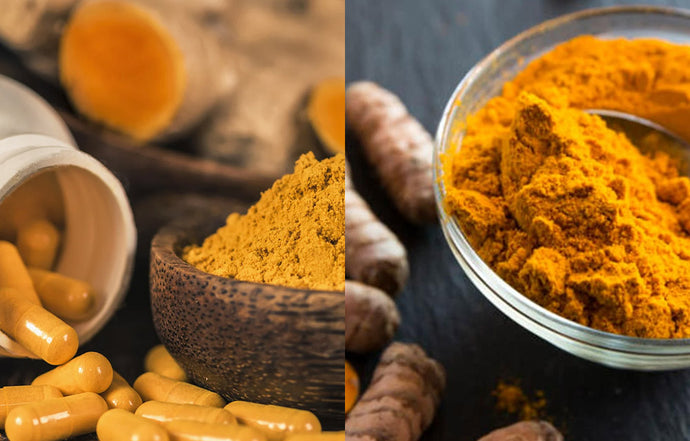
Curcumin vs Turmeric: Which One Is Better for You?
Turmeric is the most widely used culinary herb in India. The yellow colour spice has medicinal properties including anti-inflammatory, anti-oxidant, and may also help treat arthritis, cancer, and depression.
Curcumin is the key bioactive compound of turmeric. Most of the health benefits of turmeric are due to its active ingredient curcumin.
Turmeric comes from a flowering plant of the ginger family known as Curcuma Longa. Turmeric rhizomes are boiled in water, dried, and after that, they are ground into powder. It is a staple Ayurvedic medicine used to treat skin disorders, digestive problems, and pains.
It is interesting to know that curcuminoids are a group of active compounds in turmeric. The three main curcuminoids are curcumin, desmethoxycurcumin, and bisdemethoxycurcumin. Of these, curcumin gives turmeric its natural flavour and colour. Read on to analyze curcumin vs turmeric and find which one is best for you.
What Is the Difference Between Turmeric and Curcumin?
Turmeric and curcumin are often used interchangeably but they have a difference. Turmeric is derived from the roots of the turmeric plants whereas curcumin is extracted from the turmeric itself. The bio-active curcumin offers multiple health benefits and has greater potency than turmeric.
In general, natural food sources are better than supplements, but the same is not true with turmeric. The bright yellow spice is used for making curry dishes, mixed in milk, or other preparations like turmeric tea. Curcumin is ideal for treating diseases that require a higher concentration.
Turmeric is useful for treating inflammatory conditions like arthritis, asthma. cardiovascular problems, and skin diseases, it’s difficult to experience medicinal effects by just sprinkling its powder into foods. Therefore, curcumin supplements are a must if you want to experience its true benefits.
Curcumin and Turmeric: Their Shared Benefits
Turmeric and curcumin share common health benefits, the difference lies in curcumin’s potency. Read on to learn about some of the shared health benefits of curcumin and turmeric for these conditions.
Osteoarthritis: Turmeric and curcumin can reduce markers of inflammation that help relieve osteoarthritis symptoms.
Heart Disease: Turmeric and curcumin can reduce the risk of heart disease by reducing LDL or bad cholesterol and triglycerides.
Diabetes: Turmeric and curcumin can potentially reduce the effects of diabetes on your body by regulating blood sugar metabolism.
Obesity: Turmeric and curcumin can help regulate body fat by inhibiting the inflammatory pathway involved in obesity.
Cancer: Turmeric and curcumin can target cancer cells in a multiple-way that includes blocking signalling pathways, regulating transcription factors, and inhibiting invasions and metastasis.
Liver Protection: Turmeric and curcumin can help reduce oxidative stress by neutralizing free radicals in the body. Cleansing harmful chemicals from the body help protect the liver and improve its function.
Antifungal: Turmeric and curcumin exhibit effective antifungal activity against the two phytophagous fungi, Fusarium solani and Helminthosporium oryzae. They disrupt the fungal cell membrane and could be used along with the antifungal medicines for better results.
Antibacterial: Turmeric and curcumin exert strong antibacterial effects. They inhibit the growth of many disease-causing bacteria.
Interestingly, turmeric also contains chemical compounds other than curcumin. One such chemical compound is Curdione which has the best inhibitory effect. Curdione, when combined with the other seven components of the turmeric exhibit even a stronger antifungal activity.
The Benefits of Turmeric: Scientific Evidences
While curcumin is credited for most of the health benefits, turmeric might have other chemical compounds that can contribute to the many health benefits as well. Scientific research has shown that turmeric alone can be more powerful at treating certain diseases compared to curcumin alone.
In a study, turmeric was more effective at inhibiting breast cancer cell growth compared to curcumin. Researchers found 66% growth inhibition versus 33% in the comparative effect of turmeric and curcumin on cancer cells respectively.
Another research showed that curcumin exhibited antifungal properties, but when all the eight components of turmeric were used for treatment together, the antifungal effects were magnified.
The Benefits of Curcumin: Scientific Evidences
Most of the scientific research has been done to look at the efficacy of curcumin for various diseases.
A study shows that curcumin could be more effective anti-inflammatory than over the counter medicines like ibuprofen and aspirin. It helps treat inflammatory joint conditions like osteoarthritis and rheumatoid arthritis effectively.
Another study showed that curcumin offers more heart-protective benefits by improving endothelial function. The thin membranes of the heart and blood vessels help regulate blood pressure. The low endothelial function may contribute to an increased risk of heart disease.
Alternatively, curcumin has been found more effective in reducing blood sugar levels compared to turmeric.
Turmeric vs Curcumin Supplements
Both turmeric and curcumin can reduce cholesterol, joint inflammation, blood sugar level, fungus, and bacterial growth. Although turmeric is well-tolerated and has no adverse side effects even at higher dosages, turmeric supplements are not recommended. This is because turmeric is less bioavailable. It is not absorbed by the gut easily, so you may experience a little benefit from using turmeric.
However, curcumin supplements are much better. They are combined with chemical compounds to increase their bioavailability. With increased dissolution, your gut can easily absorb the curcumin that allows you to experience the true benefits of the curcumin supplement.
Sources of Curcumin
Curcumin is produced in Curcuma longa or turmeric plants. It is the principal compound of the curcuminoid group. Scientific research shows that curcumin is the most active and most beneficial compound found in turmeric. On average, 2-8% curcumin is found in natural turmeric. As a thumb rule, one fresh teaspoonful of ground turmeric has around 200 milligrams of curcumin.
What Are Turmeric Capsules Good for?
Turmeric capsules contain curcumin which is a powerful bioactive compound. Curcumin’s anti-inflammatory activity can help treat Alzheimer’s, cardiovascular diseases, and even cancer. Its antioxidant activity is useful for cleansing toxins from the body which helps prevent diseases and its recurrences.
Turmeric capsules have refined curcumin with chemical agents that increases its bioavailability, which is one of the most sought benefits of taking turmeric capsules. Also, there are fewer chances of adulteration with encapsulated turmeric.
If you consume turmeric powder, it might get contaminated when it comes in contact with air or light. Turmeric capsules can preserve the quality of turmeric for a longer period. Alternatively, they also contain a high concentration of curcumin which is key for experiencing its full effects.
Before consuming turmeric powder, you either need milk or other food items for mixing it. Also, turmeric poorly dissolves in water, making it difficult to consume orally. However, curcumin capsules can be swallowed with water and it easily gets dissolved and absorbed in our gut.
Both turmeric and curcumin are safe and offer many health benefits. However, curcumin appears to be more potent when consumed orally. Give your family an immunity booster, choose curcumin to keep them protected against diseases.
Which Is the Best Turmeric Supplement?
The best turmeric supplement is the one that has a high concentration of pure curcumin with bioavailable agents. SNEC30 is a highly bioavailable self-nano emulsifying curcumin. It is based on the SNEDD self-nano emulsifying drug delivery technique which is a US patented formula.
Curcumin is hydrophobic which means it is a poorly water-soluble compound. SNEDD technique helps overcome this problem to get the full benefits of turmeric. Watch this video to see how SNEC30 curcumin quickly gets dissolved in water while the plain curcumin floats on water.
Our curcumin supplements are available as SNEC30 Curcumin capsules, SNEC Oral Gel, and SNEC-P Drops. Visit the SNEC30 website to buy these high-quality curcumin supplements.

